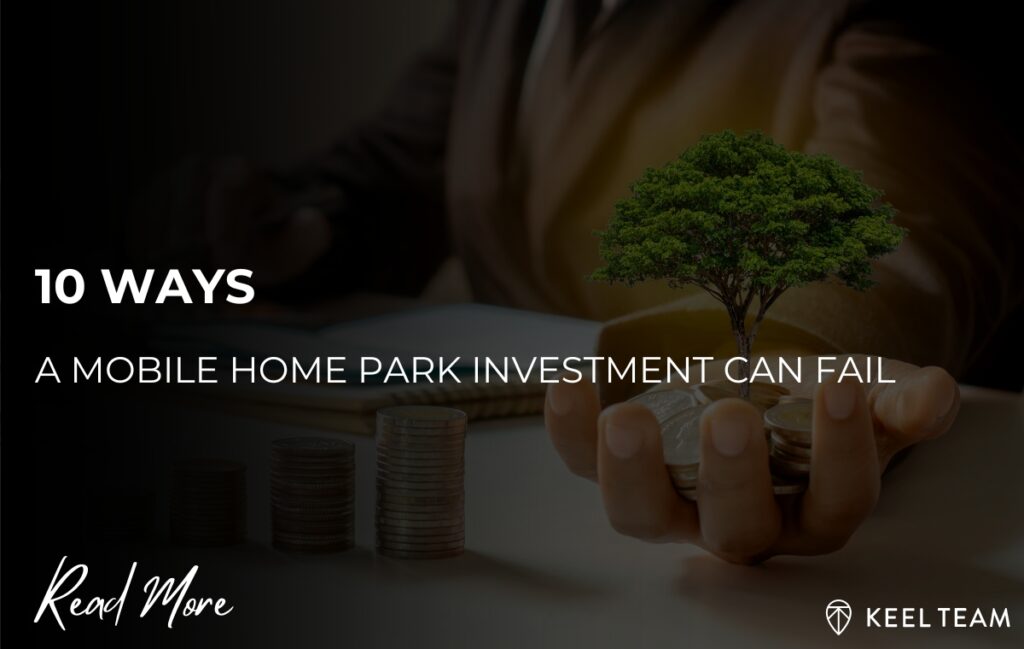10 Ways a Mobile Home Park Investment Can Fail
-
 Tristan Hunter - Investor Relations
Tristan Hunter - Investor Relations

Investing in mobile home parks can be potentially lucrative, but like any investment, it comes with its own set of risks. Understanding these risks is crucial for potential investors. Here are ten ways a mobile home park investment can fail and how to avoid them.
1. Natural Disasters
One of the most significant risks is the potential for natural disasters like tornadoes. Tornadoes can cause extensive damage, resulting in a loss of income if the homes are destroyed. To mitigate this risk, ensure that your tenants have insurance on their homes. Additionally, carry loss of business income insurance to cover the potential loss of income during recovery. Staying hands-on and maintaining good relationships with tenants can help retain them even after a disaster.
2. Drastic Rent Increases
Another common mistake is increasing rents too drastically. A sudden and significant rent hike can lead to a mass exodus of tenants. It’s essential to implement gradual rent increases and focus on adding value through renovations and infilling vacant lots. This approach helps maintain a stable occupancy rate and likely increases income more sustainably.
3. Utility Infrastructure Issues
Many mobile home parks have outdated utility infrastructure, leading to problems like sewage leaks and water line breaks. These issues can be costly and may even result in the mobile home park being shut down if not addressed promptly. Conduct thorough due diligence on the utility infrastructure before purchasing and plan for necessary upgrades. Regular maintenance and inspections are also crucial to prevent major failures.
4. Insufficient Insurance Coverage
Not carrying enough insurance can be a fatal mistake. Ensure that all improvements and assets are accurately valued and adequately insured. Work with an insurance agent experienced in mobile home parks to get the right coverage. For example, a wastewater treatment plant might be undervalued in an appraisal, leading to inadequate insurance coverage and substantial out-of-pocket expenses if it needs replacement.
5. Private Utilities
Private utilities can pose significant challenges compared to public utilities. Issues with water quality, sewage, and other utilities can lead to tenant dissatisfaction and legal liabilities. Ensure that you have proper management and oversight of these utilities. Regular testing and compliance with regulations are critical to avoid potential problems.
Check out this short video below on the 10 ways Andrew Keel thinks a mobile home park investment can fail:
6. Bad Tenants
Failing to conduct thorough background checks can result in a high turnover of tenants and increased maintenance costs. Implement a strict screening process to ensure that tenants are reliable and have a good rental history. Addressing tenant issues promptly and maintaining a clean, safe environment can also help attract and retain good tenants.
7. Poor Maintenance
The broken window theory suggests that visible signs of neglect lead to more significant problems and bad behavior. Regular maintenance and quick repairs are essential to keep the community looking good and maintaining a high standard of living. This approach helps prevent further deterioration and promotes a positive community atmosphere.
8. Lack of Rules Enforcement
Not enforcing rules can lead to chaos and degrade the quality of life for all residents. Establish clear rules and consistently enforce them. This practice helps maintain order and ensures that all tenants understand and respect the community standards.
9. High CapEx Due to Old Homes
Buying a mobile home park with a high number of older homes can lead to excessive capital expenditures. Older homes often require more frequent repairs and updates, eating into your cash flow. Aim for a mix of newer and older homes to balance maintenance costs. Be prepared to invest in significant upgrades if necessary.
10. Shrinking Population
Investing in a mobile home park located in a shrinking population area can be risky. If people are leaving the area, it might be challenging to maintain occupancy and sell homes. Conduct thorough market research during due diligence to understand population trends. Look for properties in stable or growing areas to help ensure a steady demand for housing.
Conclusion
Mobile home park investments can potentially be highly rewarding but require careful planning and management. Conducting thorough due diligence, maintaining good relationships with tenants, and ensuring proper insurance coverage are just a few ways to help mitigate risks. Remember, investing in mobile home parks is not a passive venture; it demands active management and a hands-on approach to be potentially successful. By understanding and addressing these common pitfalls, you can improve your chances of achieving a profitable and sustainable investment. Good luck!
Learn more about mobile home park investing.
Interested in learning more about mobile home park investing? Get in touch with us today to find out more.
Disclaimer:
The information provided is for informational purposes only and is not investment advice or a guarantee of any kind. We do not guarantee profitability. Make investment decisions based on your own research and consult registered financial and legal professionals. We are not registered financial or legal professionals and do not provide personalized investment recommendations.

Tristan Hunter - Investor Relations
View The Previous or Next Post
Subscribe Below 👇





